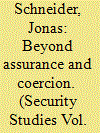| Srl | Item |
| 1 |
ID:
177068


|
|
|
|
|
| Summary/Abstract |
This article examines the proliferation-inhibiting effect of US alliances. Existing explanations for nuclear reversals of US allies have focused either on the assurance that alliances provide or on US threats of abandonment. However, neither model can account for the fact that allied leaders disagreed over the reversal decision. Also, whether an ally agreed to or rejected nuclear restraint depended on which policymakers carried the day as much as on external factors. To explain why some policymakers accept and others refuse nuclear reversal, I draw on a psychological aspect of US alliances: the social pressure inherent in demands by the United States as an ally holding a superior international status. New evidence from Germany and South Korea shows only policymakers who acknowledge this higher rank of the United States, and hence view their own nation as inferior, respond to this social pressure by obeying the US demand for a nuclear reversal.
|
|
|
|
|
|
|
|
|
|
|
|
|
|
|
|
| 2 |
ID:
171765


|
|
|
|
|
| Summary/Abstract |
For both nuclear proliferation and nuclear weapons restraint, the individual characteristics of political leaders—their beliefs, experiences, and identities—frequently play an important role. And yet, theories of proliferation have so far paid insufficient attention to the influence of leaders, focusing instead on international and domestic structures that allegedly determine states’ nuclear choices. This article makes two contributions. First, by showing that important cases of both nuclear weapons pursuit and nuclear reversal cannot be fully understood when neglecting the role of the involved leaders, the article makes a systematic case for an increased analytical emphasis on political leaders in theories of proliferation. Second, the article offers practical advice for scholars seeking to develop proliferation theories that take leader characteristics into account. Specifically, it shows how scholars can preempt endogeneity concerns. Moreover, the article details how changing the dependent variable—from state behavior to leader attitude—could help scholars overcome the aggregation problem in the study of proliferation dynamics.
|
|
|
|
|
|
|
|
|
|
|
|
|
|
|
|